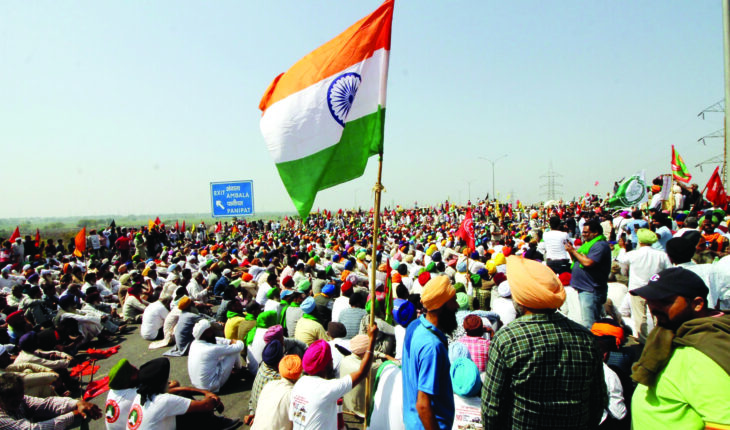NEW DELHI: India has been dropped from a list of “free” countries drawn up by an 80-year-old democracy watchdog mostly funded by the US government.
Freedom House has placed India in the “partly free” category in its latest report that carries the observation that the free world had shrunk as a result and that the country was being driven towards “authoritarianism”.
Freedom House is a Washington-based non-profit, non-government organisation that has been conducting research and advocacy on democracy, political freedom and human rights since 1941.
The report released on Wednesday notes that instead of “serving as a champion of democratic practice and a counterweight to authoritarian influence from countries such as China, (Prime Minister Narendra) Modi and his party are tragically driving India itself toward authoritarianism”.
Elsewhere in the report, Freedom House states: “Under Modi, India appears to have abandoned its potential to serve as a global democratic leader, elevating narrow Hindu nationalist interests at the expense of its founding values of inclusion and equal rights for all.”
A statement released by the Indian Ministry of Information and Broadcasting said the report was “misleading, incorrect and misplaced”.
The government gave a seven-point rebuttal to the report, saying that India’s election process and its federal structure reflected “a vibrant democracy, which gives space to those who hold varying views”.
US secretary of state Antony Blinken described the Freedom House report as “sobering” in his first foreign policy speech.
Explaining the reason for shifting India, Freedom House stated: “India’s status declined from free to partly free due to a multiyear pattern in which the Hindu nationalist government and its allies have presided over rising violence and discriminatory policies affecting the Muslim population and pursued a crackdown on expressions of dissent by the media, academics, civil society groups, and protesters.”
Some of the specific reasons for the change in scores on various counts that resulted in India losing its “free” status include the frequent use of the sedition law and other charges to deter free speech, the restrictions on foreign funding of NGOs and the action against Amnesty which resulted in it shutting shop in India, “the unusual appointment of a recently retired chief justice to the upper house of Parliament”, and the “excessively harsh” lockdown that triggered the displacement of millions.
According to the report, the Modi government and its state-level allies continued to crack down on critics in 2020, and “their response to Covid-19 included a ham-fisted lockdown that resulted in the dangerous and unplanned displacement of millions of internal migrant workers”.
It also took note of the “corona jihad” narrative whereby “the ruling Hindu nationalist movement also encouraged the scapegoating of Muslims, who were disproportionately blamed for the spread of the virus and faced attacks by vigilante mobs”.
Given that India is the world’s most populous democracy, the free world has shrunk because of the country’s fall from the upper ranks of free nations, the report noted, adding that it could have a particularly damaging impact on global democratic standards.
“Political rights and civil liberties in the country have deteriorated since Narendra Modi became Prime Minister in 2014, with increased pressure on human rights organisations, rising intimidation of academics and journalists, and a spate of bigoted attacks, including lynchings, aimed at
Muslims. AGENCIES
Freedom House has placed India in the “partly free” category in its latest report that carries the observation that the free world had shrunk as a result and that the country was being driven towards “authoritarianism”.
Freedom House is a Washington-based non-profit, non-government organisation that has been conducting research and advocacy on democracy, political freedom and human rights since 1941.
The report released on Wednesday notes that instead of “serving as a champion of democratic practice and a counterweight to authoritarian influence from countries such as China, (Prime Minister Narendra) Modi and his party are tragically driving India itself toward authoritarianism”.
Elsewhere in the report, Freedom House states: “Under Modi, India appears to have abandoned its potential to serve as a global democratic leader, elevating narrow Hindu nationalist interests at the expense of its founding values of inclusion and equal rights for all.”
A statement released by the Indian Ministry of Information and Broadcasting said the report was “misleading, incorrect and misplaced”.
The government gave a seven-point rebuttal to the report, saying that India’s election process and its federal structure reflected “a vibrant democracy, which gives space to those who hold varying views”.
US secretary of state Antony Blinken described the Freedom House report as “sobering” in his first foreign policy speech.
Explaining the reason for shifting India, Freedom House stated: “India’s status declined from free to partly free due to a multiyear pattern in which the Hindu nationalist government and its allies have presided over rising violence and discriminatory policies affecting the Muslim population and pursued a crackdown on expressions of dissent by the media, academics, civil society groups, and protesters.”
Some of the specific reasons for the change in scores on various counts that resulted in India losing its “free” status include the frequent use of the sedition law and other charges to deter free speech, the restrictions on foreign funding of NGOs and the action against Amnesty which resulted in it shutting shop in India, “the unusual appointment of a recently retired chief justice to the upper house of Parliament”, and the “excessively harsh” lockdown that triggered the displacement of millions.
According to the report, the Modi government and its state-level allies continued to crack down on critics in 2020, and “their response to Covid-19 included a ham-fisted lockdown that resulted in the dangerous and unplanned displacement of millions of internal migrant workers”.
It also took note of the “corona jihad” narrative whereby “the ruling Hindu nationalist movement also encouraged the scapegoating of Muslims, who were disproportionately blamed for the spread of the virus and faced attacks by vigilante mobs”.
Given that India is the world’s most populous democracy, the free world has shrunk because of the country’s fall from the upper ranks of free nations, the report noted, adding that it could have a particularly damaging impact on global democratic standards.
“Political rights and civil liberties in the country have deteriorated since Narendra Modi became Prime Minister in 2014, with increased pressure on human rights organisations, rising intimidation of academics and journalists, and a spate of bigoted attacks, including lynchings, aimed at
Muslims. AGENCIES





